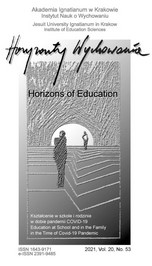Edukacja dzieci w duchu myślenia technicznego jako przejaw społecznej odpowiedzialności klastra
Children’s Education in the Spirit of Technical Thinking as an Expression of the Cluster Social Responsibility
Author(s): Bogusław BembenekSubject(s): School education, Cognitive Psychology, Sociology of Education, Pedagogy
Published by: Uniwersytet Ignatianum w Krakowie
Keywords: education; social responsibility; cluster;
Summary/Abstract: RESEARCH OBJECTIVE: The article focus on characteristics of the cluster socially responsible approach to the shaping of children technical thinking within the framework of extracurricular technical education. RESEARCH PROBLEM AND METHODS: In the research process traditional methodology of scientific literature review, desk research and case study method were used. During the qualitative research, the case study method allowed for an in-depth exploration of the selected research problem, and then for its comprehensive characterisation. The Polish scientific literature lacks publications and a broader discussion on extracurricular technical education in Polish clusters explaining the essence, mechanisms and conditions of educational initiatives and programs emerging in the entrepreneurial and innovative environment of clusters. This is a relatively new area of study and analysis that provides many research questions. PROCESS OF ARGUMENTATION: The own research, whose effects were included in the article, focused on the analysis of extracurricular technical education of children in the cluster. Reference to the children’s technical education as an indication of the cluster social responsibility is an important phenomenon, as new challenges and opportunities emerge with the involvement of cluster community in the contemporary education process. RESEARCH RESULTS: A typical research and analyses show that clusters more or less technologically advanced as learning organisations and based on a three-sector partnership provide excellent conditions for efficient children technical education. On the one hand, their unique socially useful activity is conducive to the continuous dissemination and socialisation of science, including the transfer of knowledge, and on the other hand, it enriches the pedagogical issues resulting from the inclusion of children in areas previously reserved for the academic community. CONCLUSIONS, INNOVATIONS, AND RECOMMENDATIONS: The issues discussed in the article require further research and analysis. It is justified to take into account broader sociological, psychological and axiological considerations on the nature of contemporary challenges for cluster management in the area of inclusive improvement of technical education, taking into account the various expectations of employers and the requirements of a dynamically changing labour market.
Journal: Horyzonty Wychowania
- Issue Year: 20/2021
- Issue No: 53
- Page Range: 89-101
- Page Count: 12
- Language: Polish

